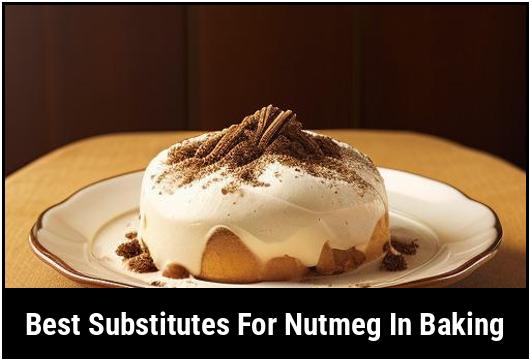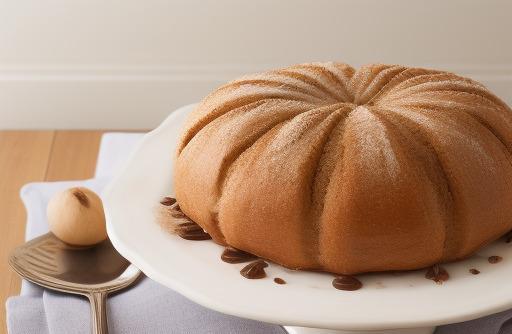Best Substitutes For Nutmeg In Baking

Nutmeg is a popular spice that adds warmth and depth to a variety of baked goods. It has a distinct flavor profile that is both sweet and savory, making it versatile in the kitchen. However, there may be times when you find yourself out of nutmeg or simply want to try something different. In such cases, having knowledge about the best substitutes for nutmeg in baking can come in handy.
This article will explore different types of substitutes for nutmeg, their flavors, and how to use them effectively in your baking endeavors. Whether you are looking for a spice with similar characteristics or want to experiment with new flavors, we have got you covered.
Key Takeaways
- Nutmeg is a versatile spice that adds warmth and depth to baked goods.
- There are various substitutes available to mimic the flavor and aroma of nutmeg.
- Some substitutes include cinnamon, allspice, cardamom, mace, and cloves.
- The choice of substitute depends on personal preference and recipe requirements.
- Experimenting with different substitutes can open up new flavor profiles in your baking.
Why You Need A Substitute For Nutmeg In Baking
While nutmeg is a go-to spice in many baking recipes, there are several reasons why you may need a substitute:
- Unavailability: It is not uncommon for home cooks to run out of specific spices, including nutmeg. Having a substitute on hand can save you from having to make an extra trip to the grocery store.
- Allergies or Sensitivities: Some individuals may have allergies or sensitivities to nutmeg. In such cases, a substitute allows them to enjoy the flavor of spices without risking any adverse reactions.
- Preference: Personal taste preferences differ, and not everyone enjoys the flavor of nutmeg. Substituting it with other spices can provide an opportunity to experiment with different flavors.
Types Of Substitutes For Nutmeg In Baking

When looking for a substitute for nutmeg, it is important to consider the flavor profile and aroma that you are trying to replicate. Here are some popular substitutes for nutmeg in baking:
- Cinnamon: Cinnamon is a widely available spice that shares similar warm and sweet flavors with nutmeg. It has a slightly milder taste and aroma, making it a great choice for substituting nutmeg in recipes. Cinnamon works well in both sweet and savory dishes.
- Allspice: Allspice is a spice made from dried berries of the Pimenta dioica plant. It has a distinct and complex flavor that combines the flavors of cinnamon, cloves, and nutmeg. Allspice can be used as a 1:1 substitute for nutmeg in most recipes. It is particularly suitable for desserts, such as pies and cakes.
- Cardamom: Cardamom is a spice with a strong and unique flavor. It has citrusy, minty, and slightly herbal notes. While cardamom does not taste exactly like nutmeg, it can provide a similar warmth and complexity to baked goods. Use cardamom sparingly, as it has a strong flavor that can overpower other ingredients.
- Mace: Mace is a spice derived from the outer covering of the nutmeg seed. It has a similar flavor profile to nutmeg but is slightly milder and more delicate. Mace can be used as a 1:1 substitute for nutmeg in recipes. It is commonly used in spice blends and pairs well with sweet and savory dishes.
- Cloves: Cloves have a strong and pungent flavor that is often associated with holiday baking. While their flavor differs from nutmeg, cloves can add depth and warmth to baked goods. Ground cloves can be used as a substitute for nutmeg in recipes that call for a warm and spiced flavor.
Best Substitutes For Nutmeg In Baking
Now, let’s explore the best substitutes for nutmeg in baking and how they can enhance your favorite recipes:
- Cinnamon: As mentioned earlier, cinnamon is an excellent substitute for nutmeg. Its warm and sweet flavor pairs well with a wide range of baked goods. Use cinnamon as a 1:1 substitute for nutmeg in recipes such as apple pie, cinnamon rolls, or spiced cookies. It can also be sprinkled on top of hot beverages or oatmeal for a cozy and aromatic touch.
- Allspice: Allspice is another versatile spice that can replace nutmeg in baking. Its combination of flavors makes it a great choice for fruit-based desserts and spiced cakes. Use allspice in a 1:1 ratio in recipes like pumpkin bread, fruit crumbles, or gingerbread. The depth and complexity of allspice will add a unique twist to your baked goods.
- Cardamom: If you are looking to add a touch of exotic flavor to your baked goods, cardamom is the way to go. It has a strong and aromatic taste that pairs well with citrusy and floral flavors. Use ground cardamom in a 1:1 ratio to substitute nutmeg in recipes like sweet bread, tea cakes, or shortbread cookies. The fragrance and warmth of cardamom will infuse your baked goods with a delightful twist.
- Mace: Mace is a lesser-known spice that comes from the same plant as nutmeg. It has a similar flavor profile to nutmeg but is slightly milder. Use ground mace as a 1:1 substitute for nutmeg in recipes like custards, rice pudding, or spice cakes. The delicate and subtle flavor of mace will give your baked goods a comforting and aromatic touch.
- Cloves: With their strong and spicy flavor, cloves can be used as a substitute for nutmeg in certain recipes. Use ground cloves in a 1:1 ratio for recipes such as gingerbread, spiced cakes, or mulled cider. The intense and aromatic flavor of cloves will bring warmth and depth to your baked goods.
Choosing The Right Substitute For Nutmeg In Baking
When selecting a substitute for nutmeg in baking, it is important to consider the flavor profile of the substitute and the specific requirements of your recipe. Here are a few factors to keep in mind when choosing a substitute:
- Flavor: Consider the flavor profile of the substitute and how it will complement the other ingredients in your recipe. For example, cinnamon pairs well with apples and pumpkin, while cardamom enhances floral and citrus flavors.
- Intensity: Some substitutes, such as cloves or cardamom, have a strong and distinctive flavor. Use them sparingly to avoid overpowering the other ingredients in your baked goods.
- 1:1 Ratio: Many substitutes can be used in a 1:1 ratio with nutmeg, making it easier to switch them out in a recipe. However, always taste and adjust as needed to achieve the desired flavor.
- Recipe Compatibility: Consider the type of baked goods you are making and whether the substitute will complement the overall flavor profile. For example, allspice pairs well with fruit-based desserts, while mace enhances creamy custards.
Experimenting with different substitutes can open up new flavor profiles in your baking. Don’t be afraid to try different combinations to suit your taste preferences and add a unique twist to your recipes.
Pro Tip: When substituting nutmeg, start with a smaller amount of the substitute and adjust to taste. Some substitutes have a stronger flavor than nutmeg, so a little can go a long way.
Cooking With Substitutes For Nutmeg In Baking
Now that you have chosen the right substitute for nutmeg in your baking, it’s time to put it into action. Here are a few tips for cooking with substitutes:
- Follow Recipe Guidelines: Start with a recipe that specifically calls for the substitute you have chosen. This ensures that the flavors and quantities are balanced correctly.
- Taste as You Go: Add the substitute gradually and taste as you go to ensure you achieve the desired flavor. Remember that some substitutes, like cloves or cardamom, have a strong flavor and can easily overpower your baked goods.
- Consider Texture: Some substitutes may have a slightly different texture than nutmeg. For example, ground cloves can be more coarse. Keep this in mind when using them in delicate recipes like custards or soufflés.
- Pair with Complementary Flavors: Enhance the flavor of the substitute by pairing it with complementary ingredients. For example, if you are using cardamom in a citrus cake, consider adding a touch of orange zest to enhance the flavor combination.
By following these tips, you can successfully incorporate substitutes for nutmeg into your baking and create delectable treats with unique flavor profiles.
Recipes Using Substitutes For Nutmeg In Baking
To inspire your culinary creativity, here are a few recipes that showcase the versatility of substitutes for nutmeg:
1. Cinnamon Apple Muffins
Ingredients:
- 2 cups all-purpose flour
- 1/2 cup sugar
- 2 teaspoons baking powder
- 1/2 teaspoon salt
- 1/2 teaspoon ground cinnamon
- 1/2 cup unsalted butter, melted and cooled
- 1 cup milk
- 2 large eggs
- 1 cup diced apples
Instructions:
- Preheat the oven to 375°F (190°C). Line a muffin tin with paper liners.
- In a large mixing bowl, combine the flour, sugar, baking powder, salt, and ground cinnamon.
- In a separate bowl, whisk together the melted butter, milk, and eggs.
- Pour the wet ingredients into the dry ingredients and stir until just combined.
- Gently fold in the diced apples.
- Divide the batter evenly among the muffin cups.
- Bake for 18-20 minutes, or until a toothpick inserted into the center comes out clean.
- Allow the muffins to cool in the tin for 5 minutes, then transfer them to a wire rack to cool completely.
Substitution:
Replace the ground cinnamon with an equal amount of freshly ground cardamom for a spiced twist on classic apple muffins.
2. Allspice Pumpkin Bread
Ingredients:
- 2 cups all-purpose flour
- 1 1/2 teaspoons baking powder
- 1/2 teaspoon baking soda
- 1/2 teaspoon salt
- 1 teaspoon ground allspice
- 1/2 teaspoon ground cinnamon
- 1/4 teaspoon ground cloves
- 1/2 cup unsalted butter, softened
- 1 cup sugar
- 2 large eggs
- 1 cup canned pumpkin puree
- 1/2 cup milk
- 1 teaspoon vanilla extract
Instructions:
- Preheat the oven to 350°F (175°C). Grease and flour a 9×5-inch loaf pan.
- In a medium bowl, whisk together the flour, baking powder, baking soda, salt, allspice, cinnamon, and cloves.
- In a large mixing bowl, cream together the softened butter and sugar until light and fluffy.
- Beat in the eggs, one at a time, then stir in the pumpkin puree.
- Gradually add the dry ingredients to the wet ingredients, alternating with the milk. Stir in the vanilla extract.
- Pour the batter into the prepared loaf pan and smooth the top.
- Bake for 50-60 minutes, or until a toothpick inserted into the center comes out clean.
- Allow the bread to cool in the pan for 10 minutes, then transfer it to a wire rack to cool completely.
Substitution:
Replace the ground cloves with an equal amount of ground mace for a subtly spiced pumpkin bread.
3. Cardamom Orange Cake
Ingredients:
- 2 cups all-purpose flour
- 1 1/2 teaspoons baking powder
- 1/2 teaspoon baking soda
- 1/4 teaspoon salt
- 1 teaspoon ground cardamom
- 1/2 cup unsalted butter, softened
- 1 cup sugar
- 2 large eggs
- 1 teaspoon vanilla extract
- 1 tablespoon orange zest
- 3/4 cup freshly squeezed orange juice
- 1/2 cup plain yogurt
Instructions:
- Preheat the oven to 350°F (175°C). Grease and flour a 9-inch round cake pan.
- In a medium bowl, whisk together the flour, baking powder, baking soda, salt, and ground cardamom.
- In a large mixing bowl, cream together the softened butter and sugar until light and fluffy.
- Beat in the eggs, one at a time, then stir in the vanilla extract and orange zest.
- Gradually add the dry ingredients to the wet ingredients, alternating with the orange juice and yogurt. Begin and end with the dry ingredients.
- Pour the batter into the prepared cake pan and smooth the top.
- Bake for 35-40 minutes, or until a toothpick inserted into the center comes out clean.
- Allow the cake to cool in the pan for 10 minutes, then transfer it to a wire rack to cool completely.
Substitution:
Replace the ground cardamom with an equal amount of ground cinnamon for a classic orange cinnamon cake.
Feel free to experiment with different flavor combinations and substitutes to customize these recipes to your liking.
Storage And Shelf Life Of Substitutes
When substituting nutmeg in baking, it’s important to properly store the substitutes to maintain their freshness and flavor. Here are some tips for storing common substitutes:
- Ground Cinnamon: Store ground cinnamon in an airtight container in a cool, dark place for up to 2 years. Avoid exposing it to heat or sunlight, as it can cause the flavor to degrade.
- Ground Allspice: Store ground allspice in an airtight container in a cool, dark place for up to 2 years. Like cinnamon, keep it away from heat and sunlight.
- Ground Cardamom: Store ground cardamom in an airtight container in a cool, dark place for up to 6 months. The flavor begins to diminish after this time, so it’s best to use it within the recommended shelf life.
- Mace: Store ground mace in an airtight container in a cool, dark place for up to 1 year. Like other spices, its flavor will degrade over time, so it’s best to use it within the recommended shelf life.
- Ground Cloves: Store ground cloves in an airtight container in a cool, dark place for up to 1 year. Over time, the flavor and aroma of cloves may decrease, so it’s advisable to use them within the recommended shelf life.
Proper storage ensures that your substitutes for nutmeg retain their flavors and aromas, allowing you to enjoy their full potential in your baking creations.
Conclusion
While nutmeg is a beloved spice in baking, there are several substitutes available to replicate its flavor and aroma. Cinnamon, allspice, cardamom, mace, and cloves are some commonly used substitutes that can add warmth and depth to your baked goods. Experimentation with different substitutes can open up new flavor profiles and add a unique twist to your recipes.
When choosing a substitute, consider the flavor profile, intensity, and compatibility with your recipe. Taste as you go and adjust the quantity of the substitute to achieve the desired flavor. Follow the recipes provided to try out different substitutes in your baking. Proper storage of the substitutes ensures their freshness and flavor.
So, the next time you find yourself running out of nutmeg or wanting to try something different, don’t fret. Embrace the versatility of substitutes and embark on a flavor-filled baking adventure.
FAQS
Are There Any Similarities Between Nutmeg And Cinnamon As Baking Spices?
Yes, cinnamon can be the best substitute for nutmeg in baking as it shares a similar warm and sweet flavor profile. However, cinnamon can be slightly stronger than nutmeg, so you may want to use a smaller amount when using it as a substitute.
Can Allspice Be Used As A Substitute For Nutmeg In Baking?
Yes, allspice, which has a combination of cinnamon, nutmeg, and clove flavors, can make a good substitute for nutmeg in baking. Its warm and earthy flavor profile makes it ideal for use in baked goods such as pies, cakes, and cookies.
Can Mace Be Used In Place Of Nutmeg In Baking?
Yes, mace, which is a spice made from the outer layer of the nutmeg seed, can be an excellent substitute for nutmeg. Its flavor is very similar to nutmeg, albeit a bit milder, and is often used in baked goods and savory dishes such as soups and stews.
Can Ginger Be Used As A Substitute For Nutmeg In Baking?
Ginger is not the best substitute for nutmeg as their flavors are quite different. However, you can use a combination of cinnamon and ginger to get a flavor that is similar to nutmeg. The zest of an orange or lemon can also add a nice citrusy flavor note to the combination.
Can Vanilla Extract Be Used As A Substitute For Nutmeg In Baking?
No, vanilla extract is not a suitable substitute for nutmeg in baking as they have completely different flavor profiles. While vanilla extract can add an aromatic flavor to your baked goods, it doesn’t have the same warmth and earthiness that nutmeg does.
Sources
About the Author Jenny
I'm Jenny, a housewife with an unwavering passion for food. My culinary journey began with my grandmother's kitchen, and it's now a full-fledged food blog. I've turned my love for cooking into a creative outlet, sharing recipes and stories with a global community of fellow food enthusiasts. It's proof that being a housewife can also mean pursuing your passions and savoring life's delectable moments.
